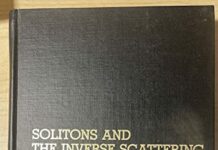
Ebook Info
- Published: 2003
- Number of pages: 660 pages
- Format: PDF
- File Size: 2.67 MB
- Authors: Mark J. Ablowitz
Description
Complex variables offer very efficient methods for attacking many difficult problems, and it is the aim of this book to offer a thorough review of these methods and their applications. Part I is an introduction to the subject, including residue calculus and transform methods. Part II advances to conformal mappings, and the study of Riemann-Hilbert problems. An extensive array of examples and exercises are included. This new edition has been improved throughout and is ideal for use in introductory undergraduate and graduate level courses in complex variables. First Edition Hb (1997): 0-521-48058-2 First Edition Pb (1997): 0-521-48523-1
User’s Reviews
Editorial Reviews: Review ‘… an excellent text, and one of the most complete and well-written books on complex variables I have seen … The index is nicely composed, complete, and accurate … useful as a reference … I highly recommend it to anyone interested in the subject and have placed it prominently upon my reference bookshelf.’ Duwayne Anderson, Optics and Photonics News’… an excellent text, and one of the most complete and well-written books on complex variables I have seen … I highly recommend it to anyone interested in the subject…’. Optics and Photonics News’Overall the book feels ‘road-tested’ both in the lecture theatre and in the crucible of research and the clear well-written text is complemented by a superb collection of worked examples and exercises ranging in scope from routine applications of techniques to more substantial illustrations of the theory.’ The Mathematical Gazette’… the book is valuable for students in engineering and physical sciences.’ ZAMM Book Description This 2003 edition is ideal for use in undergraduate and introductory graduate level courses in complex variables.
Reviews from Amazon users which were colected at the time this book was published on the website:
⭐A solid book which covers the essential introductory topics in an accessible manner. The problem sets are well designed and provide ample practice. The authors match a good balance of examples and theory with an appropriate amount of English explanation. The typos are not overly intrusive and the authors have a list of known errata which is easily accessible. I would recommend checking out the errata before reading and making the correct notations in your text, some of the mistakes listed have already been fixed in my edition.Not as authoritative as Alfors or Rudin, but certainly more readable. A good stepping stone book leading into those two.
⭐Excellent for self study. A comprehensive list of topics and problems.
⭐Good book on complex variables.
⭐If there is one book that you have to have on the subject of complex variables, this is it. It gets right into the meat of things and doesn’t slack up until the end.
⭐A concise reference book.Def. not a first course textbook.
⭐cheap Caltech text books. thanks
⭐Nice modern textbook on complex variables. The authors are well known characters in the field of integrable models, inverse scattering transform, nonlinear PDEs and the like. Fokas is a modern hero, having invented an all-purpose method for solving PDEs, linear and nonlinear! The textbook suits people interested in applied mathematics of the ODE and PDE type. It contains sections on numerical methods and entire chapters on the asymptotic evaluation of integrals and Riemann-Hilbert problems. It is more comprehensive than the basic text by R. V. Churchill. After it you can go straight into Hille’s “ODEs in the Complex Domain,” which is going to make you a pro (and at a very amicable Dover price tag).
⭐Whether you are a student, or just in need of a good reference text, Mark J. Ablowitz’ and Athanassios Fokas’ book belongs in your library. Complex Variables, Introduction and Applications is refreshingly well written. In clear and logical flow, the authors present the subject of complex variables in an easy-to-understand, yet complete format suitable for both students and practicing professionals.This text offers a broad coverage of the subject, from fundamental properties of complex numbers, analytic functions, and singularities to more advanced topics such as conformal mapping and Riemann-Hilbert problems. Although individuals interested in pure mathematics may find some of the proofs insufficiently rigorous, those using the book as a reference for engineering or scientific problems may find the text too rigid. Overall, however, the authors have done an excellent job balancing the subject matter and successfully achieving their goal of, when necessary, “sacrificing a rigorous axiomatic development with a logical development based upon suitable assumptions.”Although the mathematical development of the text is clear, concise, and easy to follow, many of the applied examples, such as those for uniform flow in section 2.1, would benefit from further physical insight. Individuals already familiar with physics will have no difficulty following many of the examples, and extending them to other situations. Those less grounded in the physical sciences, however, may find the starting equations for some of the examples to be less than intuitive. Though additional explanations would increase the book’s already substantial heft, the change would benefit many readers.It is a joy to read a well-written technical book with almost no typographical or technical errors. Except for minor (and easily recognizable) typographical errors such as that in equation 2.2.12b, the book is nearly flawless. This leaves the student free to concentrate on learning the material unencumbered by worries about the text’s accuracy.The index is nicely composed, complete, and accurate. This makes the book particularly useful as a reference. Typically, the reader will have little trouble using the index to go directly to the pages of most interest and applicability regarding the subject of inquiry. It would be nice to see a more complete bibliography, as well as a summary of common symbols. Especially useful would be a summary of some of the more important equations (such as Green’s theorem, Cauchy’s theorem, the Fourier transform, the Helmholtz equation, etc.) derived or demonstrated in the book. A list of important equations, particularly, would improve the book’s utilization as a desk reference.For the student, the text presents answers to odd-numbered questions in the back of the book. For the most part, the text presents only the answers, but occasionally the authors provide additional insight into the problem’s solution, as in section 5.2. This will be useful for those engaged in independent study.Overall, this is an excellent text, and one of the most complete and well-written books on complex variables I have seen. I highly recommend it to anyone interested in the subject, and have placed it prominently upon my reference bookshelf.
⭐Good book for complex analysis
⭐La bellezza di questo libro è che un argomento non proprio banale, quale è appunto l’analisi complessa, viene trattato in un modo estremamente chiaro e per certi versi persino discorsivo, senza venire meno al necessario rigore e precisione. Lo consiglio soprattutto per chi si deve avvicinare all’analisi nel complesso per applicazioni in settori quali l’analisi numerica, l’ingegneria, ecc.. Per quanto possa sembrare strano (visto l’argomento) il testo non è solo chiaro e ben scritto, ma anche bello da leggere (ovviamente per un pubblico di addetti ai lavori).
⭐
Keywords
Free Download Complex Variables: Introduction and Applications (Cambridge Texts in Applied Mathematics, Series Number 35) 2nd Edition in PDF format
Complex Variables: Introduction and Applications (Cambridge Texts in Applied Mathematics, Series Number 35) 2nd Edition PDF Free Download
Download Complex Variables: Introduction and Applications (Cambridge Texts in Applied Mathematics, Series Number 35) 2nd Edition 2003 PDF Free
Complex Variables: Introduction and Applications (Cambridge Texts in Applied Mathematics, Series Number 35) 2nd Edition 2003 PDF Free Download
Download Complex Variables: Introduction and Applications (Cambridge Texts in Applied Mathematics, Series Number 35) 2nd Edition PDF
Free Download Ebook Complex Variables: Introduction and Applications (Cambridge Texts in Applied Mathematics, Series Number 35) 2nd Edition

